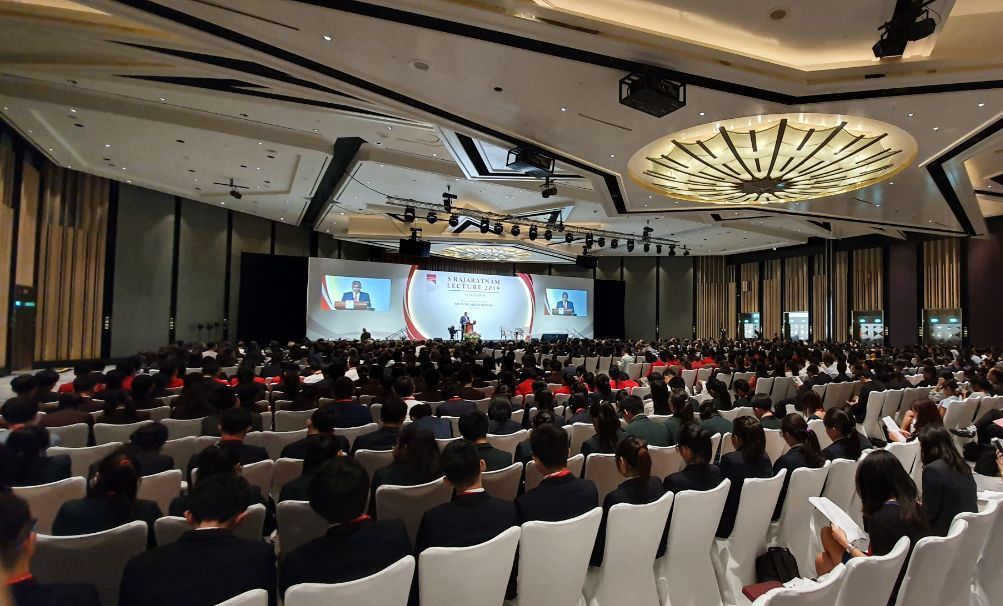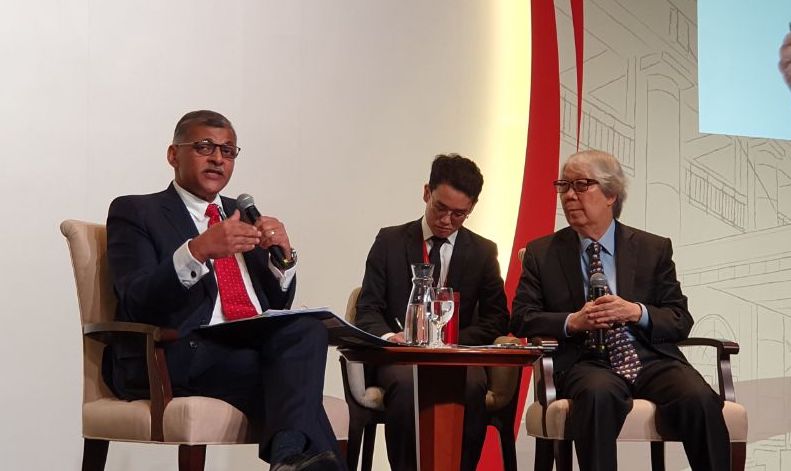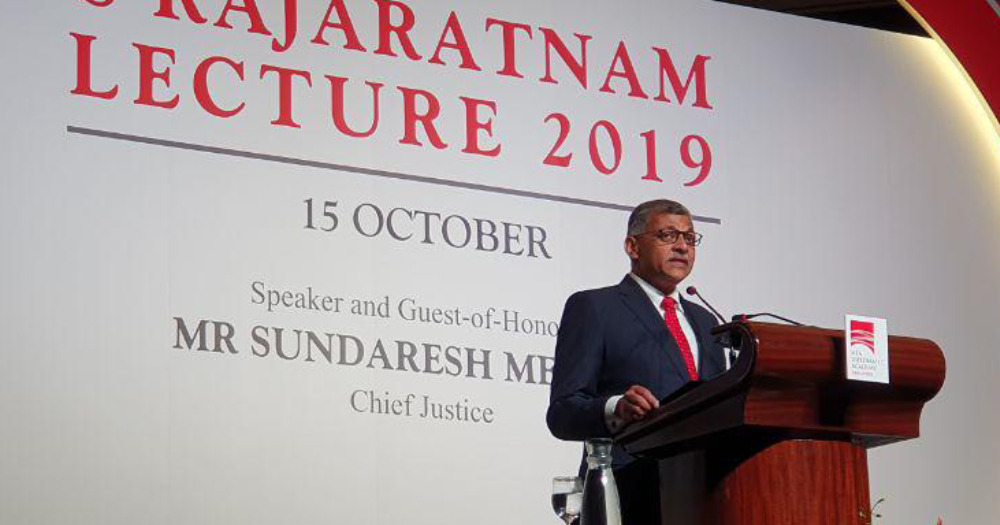International rule of law is an existential necessity for Singapore, said Singapore's Chief Justice Sundaresh Menon.
Speaking at the 11th S. Rajaratnam Lecture on Tuesday, Oct. 15, Menon said Singapore's foreign policy as a small state has to be founded on the promotion and preservation of the international rule of law.
The event, organised by Singapore's Ministry of Foreign Affairs, is an annual platform for distinguished guests to talk about topics related to Singapore's foreign policy and international relations.
Previous speakers included the late Lee Kuan Yew, the late President S R Nathan, former President Tony Tan, Prime Minister Lee Hsien Loong, Deputy Prime Minister Tharman Shanmugaratnam and former Foreign Minister George Yeo.
In fact, Menon joked that he was conscious of "being the first speaker from outside the executive branch to be invited to deliver this lecture".
About 850 government officials, foreign dignitaries, academics and students were in attendance.
 Image by Julia Yeo
Image by Julia Yeo
Singapore is not a vassal who tethers its fate to strongest power
"Our future lies not in the naive tactic of tethering our fate to whoever we think is the strongest power, for that will mean reducing ourselves to the status of a vassal," Menon explained.
Furthermore, an alternative where brute force dictates, rather than reason and justice, is a descent into anarchy which "spells doom not only for small states, but indeed for much of humanity", he said.
While Menon acknowledged that the long arc of history has shown that a mighty power might be able to bully those with less might -- such as the capture of the island of Melos by Athens more than 2,000 years ago -- he remains confident that in today's world that is committed to the international rule of law, "no power can bully all of us, all the time".
This is due to the levers of foreign policy strategy that is in place to facilitate dialogue and diplomacy among states, instead of resorting to war.
 Ambassador-at-Large Tommy Koh praised Singapore's first Chief Justice to be born here as a visionary, a man of action, and a strong believer in Asean and judicial diplomacy. (Photo by Julia Yeo)
Ambassador-at-Large Tommy Koh praised Singapore's first Chief Justice to be born here as a visionary, a man of action, and a strong believer in Asean and judicial diplomacy. (Photo by Julia Yeo)
In addition, Menon highlighted the five core principles of relevance, defence, diplomacy, legality and consistency that frame Singapore's foreign policy.
1. Economy must continue to be successful
Firstly, Singapore has to sustain its vibrant economy.
This is because the country's international standing is founded in part on the policies that have made it relevant as a centre of trade and finance, Menon said.
He also quoted the late Prime Minister Lee Kuan Yew, who said it is Singapore's "economic imperative" to ensure that other countries have an interest in its "continued survival and prosperity as a sovereign and independent nation".
2. Strong defence force
Menon also spoke about the importance of maintaining a "strong and respected" defence force, to deter potential hostile threats, as part of Singapore's foreign policy.
He quoted Defence Minister Teo Chee Hean's remarks that diplomacy and defence in Singapore are "twins", where the military is the "last guarantor of our sovereignty".
"In turn, our defence force must be backed by a society that is resilient, stable and united in the face of external threats," he added.
3. Network of political and economic relationships must widen
Thirdly, Singapore needs to continue to widen its network of political and economic relationships, Menon said.
Singapore can do so by staying an active and contributing member of multilateral groups, such as ASEAN, the Forum of Small States, and the Global Governance group.
These groups provide a forum for Singapore to advocate its interests and influence regional policies.
They also allow small states to "make common cause", "amplifying [their] influence in the world", Menon quoted Prime Minister Lee Hsien Loong.
4. Promotion of international legal order
Similarly, Singapore needs to continue promoting an international legal order that respects reasons rather than force.
Singapore has done well in this aspect over the years, as an active and contributing member of international institutions.
Despite being a small nation, Singapore has performed notably well, from its contributions to the United Nations Convention on the Law of the Sea (UNCLOS) in 1982, to recent efforts in spearheading the Singapore Mediation Convention in August 2019.
5. Need for consistency in Singapore's foreign relations
Finally, Singapore needs to remain an "honest broker" in international affairs, as an independent and non-aligned, constructive member of the international community, Menon stated.
Only this way, Singapore can remain credible and consistent in its inter-state relationships, who "cannot be bought, nor bullied".
To accomplish this, Singapore must steadfastly adhere to its international obligations, and urge others to honour agreements as well.
Pursuit of the rule of law heart of Singapore's foreign policy
Menon further explained that these principles are closely associated with the rule of law.
For instance, Singapore's economic success is underpinned by a legal system that is "fair, efficient and well-respected".
The city-state's national defence is effective as it is founded on a stable, orderly and law-abiding society.
The country interacts with other states and takes part in international organisations in a manner consistent with its international obligations, and expects other states to do the same.
Singapore's credibility as a trusted and neutral voice is also attached to its sustained loyalty to international law.
This is why, Menon explained, the pursuit of the rule of law lies at the very heart of Singapore's foreign policy.
Related articles:
Top image by Julia Yeo
If you like what you read, follow us on Facebook, Instagram, Twitter and Telegram to get the latest updates.
